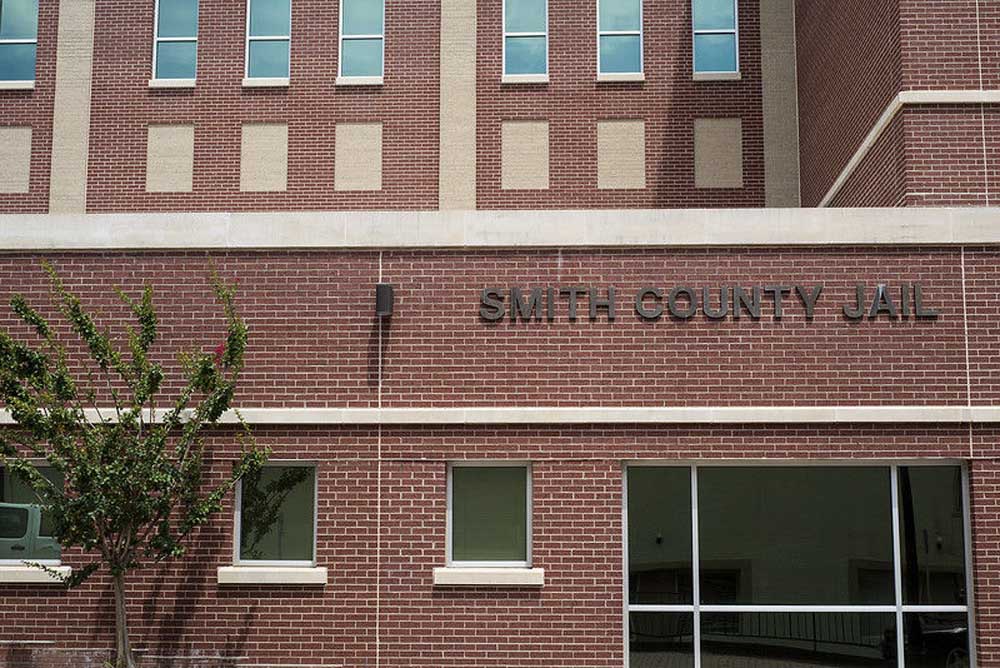Smith County Jail population at highest level in three years
Published 3:30 pm Friday, March 30, 2018

- Smith County Jail. (Tyler Morning Telegraph File)
The number of inmates staying in the Smith County Jail is at the highest level it has been since the county built and opened a new jail three years ago.
At the beginning of March, the most recent figures available, there were 763 inmates in the jail, according to data from the Texas Commission on Jail Standards, which monitors jails across the state.
That’s a 26 percent increase from the 581 inmates who were being held in the jail when it opened in February 2015. However, the 763 is still lower than Smith County Jail inmate numbers a decade ago.
Back then, the jail had space for 755 inmates, and many were held in other counties as a result, according to the Texas Commission on Jail Standards. Today, there is space for 1,149 inmates, according to the commission.
Law enforcement officials do not agree on what could be causing the increase in the jail population, but defense attorneys said that the most likely reason for the increase is that inmates can’t afford to post bail.
Sheriff Larry Smith, who runs the jail, told the Smith County Commissioners Court on March 6 that the increase could be attributed to “good law enforcement.”
The day before, Smith said in an interview, his office arrested 25 people for alleged organized crime. Over a three-day period recently, the jail booked 113 people, he said.
In recent weeks, members of the court, the legislative body for the county that is responsible for funding the jail, have begun asking questions and raising concerns at their weekly meetings about the increase in the jail population.
During a recent meeting, Commissioner Terry Phillips said the jail population was the highest he has seen since he has been on the court. He said his main concern is how much housing inmates costs taxpayers.
“It requires more guards to watch them, everything else,” Philips said. “And if there’s anything we can do to lower those numbers, I want to try to do it. I don’t know if there’s anything the Commissioners Court can do at all, but anything that we can do, I’m here.”
Phillips raised the jail population issue again at Tuesday’s meeting.
“You know people said when we built that jail, ‘You build it. They’ll come,’ and we probably told them we’d try to do all that we can, and it doesn’t look like we’re doing all we can to keep them out.”
Smith said his office is doing exactly what it’s supposed to do.
“Hey, we just lock them up,” Smith said.
Increase in inmates awaiting trial
An analysis by the Tyler Morning Telegraph shows the main source of increase in the jail population is from people who are awaiting trial.
From February 2015 to March 2018, the number of inmates in the Smith County Jail awaiting trial increased from 319 to 512 — a 61 percent increase in three years.
Over the same time period, the number of people being held in jail who have been convicted of their crimes decreased from 205 to 139 — a 32 percent decrease.
Smith County District Attorney Matt Bingham, whose office is in charge of prosecuting most of the cases against people in the Smith County Jail, said the population could be up because people decided to commit crimes.
“There’s no possible way I could answer,” he responded when asked why the jail population is up. “That’s like saying, ‘Why did we have a thunderstorm this week?’ I guess because people decide to commit crimes and they got arrested for it.”
Tyler Police Chief Jimmy Toler declined to comment on the trends in jail population. City spokeswoman Jenny Wells said the population increase is a complicated issue.
“There are a lot of reasons that people are going to be in the jail and it’s not necessarily going to be related to what crimes are happening,” Wells said.
Bobby Mims, a defense attorney in Tyler, said it’s likely that many of the people sitting in jail can’t afford to post bail. He said inmates were often low-income before they were accused of crimes and could not afford the bond amounts.
“Bonds for nonviolent offenders are just so high that people can’t afford them. Most of the time they’re just working people and essentially can’t afford the bond,” Mims said. “What you get is there’s a movement, not only in Texas, but it’s actually nationwide, to get away from (cash) bonds altogether.”
“We have people sitting in jail literally where the law says they would get probation if the case went to trial … but they’re sitting in jail because they can’t afford the bond,” Mims said.
Clifton Roberson, who often defends clients who can’t afford a lawyer, agreed with Mims. He pointed to a client who is accused of a low-level felony but can’t get out of jail because he needs to post a $150,000 cash bond.
“If you don’t have that kind of money or you don’t have a relative or a parent to post that bail amount for you, then you’re going to sit in jail until your case is disposed of,” Roberson said.
Mims said the strategy of law enforcement slows down disposing of cases. He said defense attorneys often find it hard to enter into plea deals with prosecutors. Plea deals often speed up the law enforcement process because the case settles without a trial.
“Smith County is a very tough county on prosecution and law enforcement,” Mims said. “On the defense side we find a lot of times we have to just pick the jury and try the case. A lot of the cases go to trial because the two sides simply can’t agree on a punishment.”
Smith said, “Many of them are in here on high bonds because they’ve done some very bad things.” Others are not eligible for bonds, and others violated the conditions of their probation and were sent back to jail.
“I believe the taxpayers would rather pay to keep some of these people in the jail who need to be there rather than (have them) kicking in their doors or taking their property,” Smith said.
Bingham said there are infinite reasons why a person might have a high bond amount, including the type of crime the person is accused of and whether the person has been convicted of other crimes in the past.
“The judge decides what’s appropriate and either (the defendants) make it or they don’t,” he said. “That’s the way it is.”
Monitoring the jail population
County Judge Nathaniel Moran declined to comment for this story, referring questions on the Smith County Jail to the sheriff.
Commissioner Jeff Warr said in an interview that the court has a standing item on its agenda every week to hear a report on the population of the Smith County Jail.
Warr said the court has kept that on the agenda intentionally to make sure the county isn’t putting more people in jail than the facility can handle, or that there aren’t procedural issues keeping the jail population up. He pointed to circumstances a decade ago.
“We’ve monitored that every week and get that report because a decade ago it had gotten really high and our facility couldn’t handle it and we were having to ship people out of the county,” Warr said.
Back then, Smith County sent hundreds of inmates per month out of the county to be held elsewhere, according to data from the Texas Commission on Jail Standards.
The number of people being held in Smith County and elsewhere peaked at more than 1,075 inmates, far exceeding the capacity of the jail at the time, in October 2006. That month, the county sent 327 inmates to be held in other counties.
The number of inmates being sent out of the county decreased steadily until it fell to zero in June 2016, according to data from the Texas Commission on Jail Standards. The number has stayed at zero ever since, and there is space for hundreds of more inmates in the jail.
“If it starts trending higher, it just comes to our attention,” Warr said. “And it might not be something anybody can do anything about, but we just want to make sure we’re doing the best that we can.”
TWITTER and INSTAGRAM: @_erinmansfield






